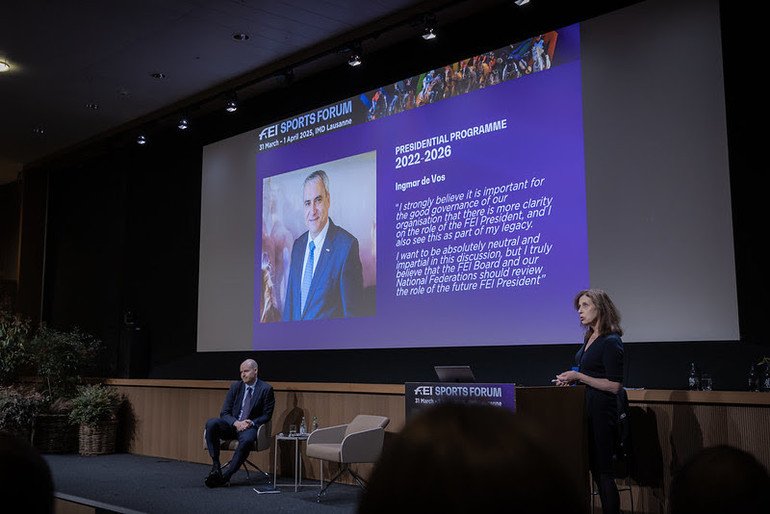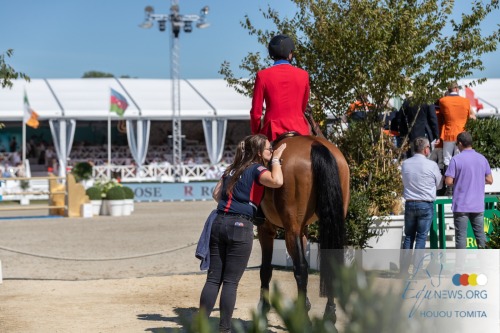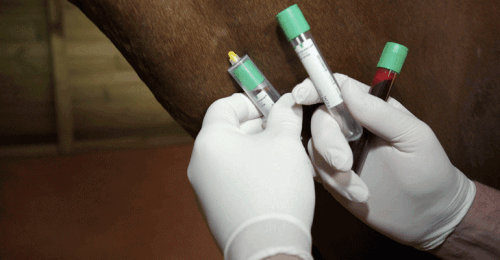The second and final day of the FEI Sports Forum 2025 kicked off with a session on the profile and job description of the future FEI President. Janice Shardlow, Chair of the FEI Audit and Compliance Committee, and James Carr, Executive Director of the Association of Summer Olympic International Federations (ASOIF), made presentations looking ahead to the 2026 FEI presidential election. During the ensuing discussion it was agreed that a job description for the future President would be prepared, and, along with any potential rules modifications, it would be presented for voting at the FEI General Assembly 2025.
Presentations on the key modification proposals for the FEI Eventing Rules and the FEI Driving and Para Driving Rules, which are undergoing full revisions this year, were made during Sessions 6 and 7. The Sports Forum 2025 ended with an update on the FEI Officials Working Group moderated by FEI Honorary Vice President and Working Group Chair, Mark Samuel.
In her closing remarks, FEI Secretary General Sabrina Ibáñez reviewed the key points for each session. She thanked the panellists and moderators for the high level of presentations over the two days and thanked delegates for the quality of the debate. She also thanked the FEI HQ Team for organising another successful edition of the FEI Sports Forum.
Profile for new FEI President
Following Ingmar De Vos’ commitment in his 2022-2026 presidential programme to provide clarity on the role of the future FEI President and ensure a structured review process prior to the election campaign for a new FEI President in 2026, the FEI President’s Succession Working Group (PSWG) was established by the FEI Board in November 2023 to evaluate the role in light of the FEI’s future needs. The Working Group is led by Chair of the Audit & Compliance Committee Janice Shardlow (GBR), with Chair of the Nominations Committee Elena Couttenye (VEN) and Emeritus Professor at the University of Lausanne Jean-Loup Chappelet (SUI) as members.
The Group’s mandate included defining the role’s scope and key competencies, and considering whether regulatory changes would be required to support the future of the position. After a number of meetings during 2024, the PSWG presented its findings to the FEI Board in November last year.
At today’s session focusing on the profile and job description of the future FEI President, PSWG Chair Janice Shardlow highlighted the responsibility of the National Federations in putting forward candidates with the future of the organisation in mind. She updated the Sports Forum on the PSWG’s work to date, and then handed over to James Carr, Executive Director of the Association of Summer Olympic International Federations (ASOIF), who provided insight into governance models across international sports federations, changes to the sporting ecosystem and the growing relevance of sport in society. He highlighted evolving challenges such as climate change, technological advancements, economic shifts, and increasing regulatory scrutiny. He underscored the importance of strong leadership, commercial adaptability, and maintaining credibility within the evolving global sporting landscape.
Carr further outlined how the role of the President of an international sports federation has evolved, detailing responsibilities, governance structures, and strategic initiatives. Different Presidential models among International Federations - honorary, supervisory and executive – were presented. James Carr emphasised that the FEI is a pioneering IF as the first to go through the process of preparing for a presidential election in such a holistic way, which he stated was the sign of a mature and sophisticated organisation.
Janice Shardlow provided a brief historical review of the past FEI presidencies. She presented the current presidential functions as per the FEI Statutes and Internal Regulations of the FEI as well as other functions as approved by the FEI Board for the current President. The Session was then opened up for discussion from the floor.
In the ensuing debate consensus was reached that although the presidential role was clearly an executive one, representative and ambassadorial functions were also important components, which could not be disregarded. Executive qualifications were essential but any job description should not be made too demanding to avoid restricting the field of potential candidates.
Given the close cooperation between the President and the Secretary General, it was felt that their roles should be looked at in combination. The work of the current leadership team, including the strong links developed with the National Federations and stakeholders, was praised and preserving the success achieved to date – particularly with regard to welfare, sustainability and solidarity – as well as ensuring continuity with a new administration was a strong requirement.



